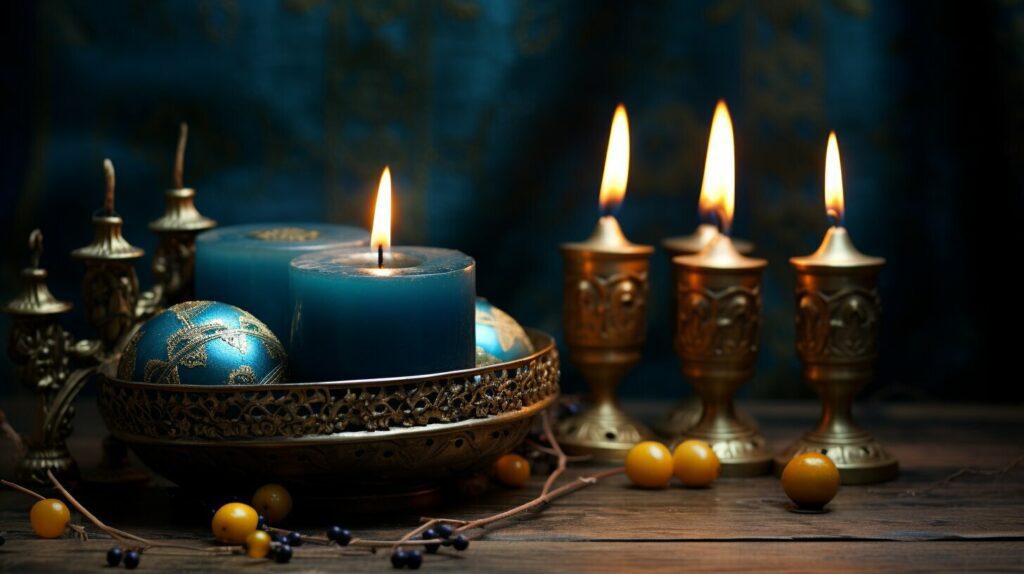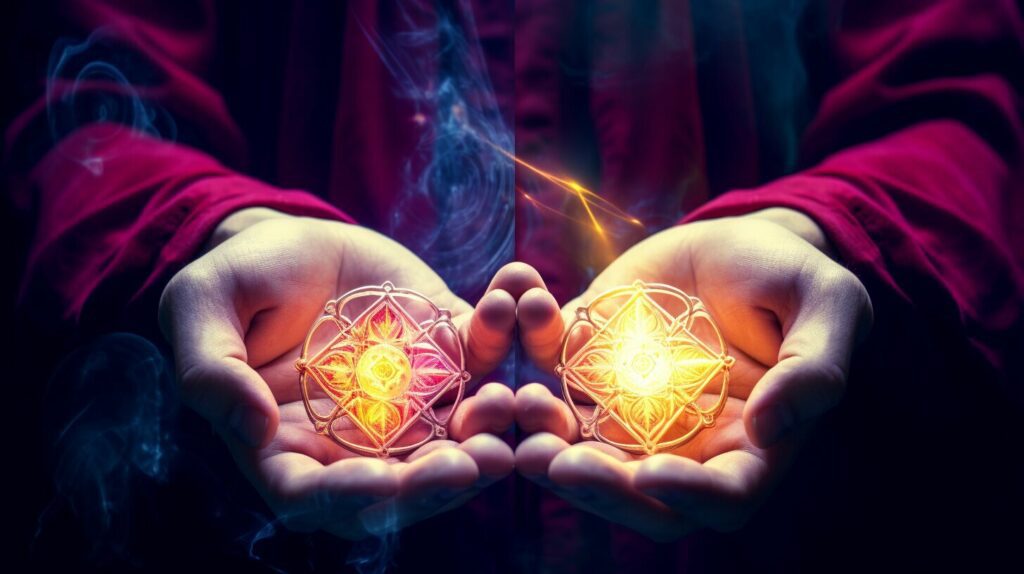Orthodox Reiki Healing

The Orthodox View on Reiki healing is based on skepticism and critical evaluation of this alternative therapy. Orthodox spirituality places emphasis on traditional beliefs and practices, and Reiki is seen as incompatible with these principles.
Reiki is often considered an alternative therapy without a scientific basis. Orthodox Christians may be skeptical of the concept of an invisible life force promoting self-healing, and they prioritize the use of orthodox medical care for diagnosis and treatment.
The religious elements of Reiki, such as the belief in a universal life force and the use of symbols and mantras, conflict with orthodox Christian beliefs. This has led to differing opinions within the Christian community regarding the practice of Reiki.
In spite of these concerns, there are Christians who practice Reiki and believe it aligns with their calling to be healers and to follow Jesus’ example. However, there is ongoing debate and disagreement within the Christian community about the compatibility of Reiki with biblical teachings.
As we explore the Orthodox View of Reiki healing, it is important to acknowledge the complexity and differing perspectives within the orthodox community. Let us delve deeper into the intersection of Reiki and orthodox beliefs, taking into account the skepticism, critical evaluation, and concerns surrounding this alternative therapy.
- The Orthodox View on Reiki is skeptical and critical, considering it an alternative therapy without scientific basis.
- Reiki’s spiritual and religious elements clash with orthodox Christian beliefs.
- There is ongoing debate within the Christian community about the compatibility of Reiki with biblical teachings.
- Some Christians practice Reiki, believing it aligns with their calling to be healers and follow Jesus’ example.
- Orthodox spirituality emphasizes traditional beliefs and practices, which do not typically include Reiki.
Orthodox Christianity and Reiki: Incompatible Beliefs?
Many orthodox Christians question the compatibility of Reiki with their faith due to the religious elements and differing interpretations. Reiki, a New Age practice rooted in the belief of a universal life force, can be seen as conflicting with the orthodox Christian beliefs. The use of symbols and mantras in Reiki, which are considered essential tools for healing, is often viewed as contrary to the teachings of orthodox Christianity.
Orthodox Christians hold firmly to the belief in one God and the importance of prayer, sacraments, and traditional worship practices. The concept of channeling energy and using symbols and mantras in Reiki can be seen as diverting from these orthodox traditions. The emphasis on self-healing and the reliance on a spiritual force outside the Christian framework can lead to skepticism and concern among orthodox believers.
While there are Christians who practice Reiki and believe it aligns with their calling to be healers and follow Jesus’ example, there is ongoing debate within the Christian community about the compatibility of Reiki with biblical teachings. Some argue that Reiki can be incorporated into a Christian worldview, emphasizing the intention behind the practice and the potential for healing through prayer and laying on of hands. Others maintain a more cautious approach, urging Christians to exercise discernment and prioritize orthodox teachings when exploring alternative healing modalities.
Orthodox Christians hold firmly to the belief in one God and the importance of prayer, sacraments, and traditional worship practices.
Table: Comparison of Orthodox Christianity and Reiki
| Orthodox Christianity | Reiki |
|---|---|
| Belief in one God | Belief in universal life force |
| Importance of prayer and sacraments | Channeling energy through symbols and mantras |
| Emphasis on traditional worship practices | Focus on self-healing and alternative therapies |
| Guidance from religious leaders | Reliance on Reiki practitioners and spiritual guides |
Despite the concerns surrounding the compatibility of Reiki and orthodox Christianity, it is important to approach the topic with open-mindedness and respect for differing perspectives. The debate within the Christian community provides an opportunity for dialogue and exploration of alternative healing practices within the context of orthodox spirituality.
Reiki as an Alternative Therapy: Lack of Scientific Basis
Orthodox teaching dismisses Reiki healing as an alternative therapy lacking scientific basis and orthodoxy’s traditional approach to healing. While Reiki practitioners believe in the existence of a universal life force that promotes self-healing, skeptics within the orthodox community question the validity of this concept. The invisible nature of this life force and the lack of scientific evidence supporting its existence raise doubts among those who adhere to orthodox teachings.
Orthodox Christians place a strong emphasis on the importance of orthodox medical care and view Reiki as a potential hindrance to proper diagnosis and treatment. Relying solely on Reiki for healing purposes may delay necessary medical intervention, which goes against the orthodox understanding of the role of medicine in the healing process. Orthodox tradition advocates for the use of scientifically proven medical treatments alongside prayer and sacraments.
“The skepticism surrounding the concept of an invisible life force promoting self-healing will be discussed, along with the orthodox teaching that emphasizes the importance of orthodox medical care.”
It is important to note that Reiki’s spiritual and religious elements, such as the use of symbols and mantras, conflict with orthodox Christian beliefs. Orthodoxy teaches a different understanding of spirituality and healing, one that centers around prayer, sacraments, and the laying on of hands within the context of orthodox traditions. Reiki’s reliance on non-Christian symbols and practices raises concerns among orthodox believers about the compatibility of Reiki with their faith.
Table: Comparison of Reiki and Orthodox Healing Practices
| Reiki Healing | Orthodox Healing |
|---|---|
| Belief in a universal life force | Belief in the power of prayer and the sacraments |
| Use of symbols and mantras | Use of Orthodox symbols and rituals |
| Spiritual and intuitive approach | Combination of spiritual and medical approaches |
While there are Christians who practice Reiki, it is essential to acknowledge the ongoing debate within the Christian community regarding its compatibility with biblical teachings. Different interpretations and opinions exist among orthodox theologians, clergy, and practitioners. Some argue that Reiki can be integrated into orthodox spirituality as a complementary practice, while others believe it is fundamentally incompatible with the Christian faith.

Potential Risks and Concerns with Reiki Healing
From an orthodox standpoint, there are concerns about the potential risks and conflicts between Reiki healing and orthodox worship practices. Orthodox Christians view Reiki as an alternative therapy lacking scientific basis and evidence. It is seen as a New Age practice that promotes self-healing through an invisible life force, which is inconsistent with orthodox teachings. As a result, relying solely on Reiki as a form of healing may lead to delays in diagnosis and treatment, posing potential risks to individuals seeking orthodox medical care.
The clash between Reiki’s spiritual aspects and orthodox worship practices is another cause for concern. Orthodox Christians believe in the power of prayer, sacraments, and the laying on of hands as sanctioned methods of healing within their faith. The use of symbols and mantras in Reiki, which are central to the practice, may be seen as incompatible with orthodox Christian beliefs.
While some Christians who practice Reiki argue that it aligns with their calling to be healers and follow Jesus’ example of compassion and care, there is ongoing debate within the Christian community about the compatibility of Reiki with biblical teachings. Orthodox theologians, clergy, and practitioners hold differing opinions on this matter, making it a complex and sensitive topic of discussion.
| Potential Risks and Concerns | Orthodox View |
|---|---|
| Delay in diagnosis and treatment | Orthodox medical care is prioritized, and reliance on Reiki alone may hinder timely intervention. |
| Clash with orthodox worship practices | The spiritual aspects of Reiki, such as the use of symbols and mantras, may conflict with orthodox Christian beliefs and practices. |
| Debate within the Christian community | There is ongoing disagreement among orthodox theologians, clergy, and practitioners about the compatibility of Reiki with biblical teachings. |
Overall, the orthodox perspective on Reiki healing highlights the potential risks and concerns associated with the practice. While individuals have the freedom to make personal choices, it is essential to approach Reiki with discernment and seek guidance from spiritual leaders within the orthodox community to navigate the complexities and potential conflicts with orthodox beliefs and practices.

Some Christians who practice Reiki view it as a way to express their calling to be healers and follow Jesus’ example. They believe that Jesus himself performed healing miracles and empowered his disciples to continue this ministry. For them, Reiki is seen as a tool that allows them to tap into the divine healing energy and channel it for the benefit of others.
While the spiritual and religious elements of Reiki may appear conflicting with orthodox Christian beliefs, these practitioners argue that it is the intention behind the practice that matters. They believe that Reiki can be approached with a Christian mindset, focusing on God’s love and Christ’s healing power rather than subscribing to any particular religious system or ideology.
“Through Reiki, I feel a deeper connection to God and His healing power,” says Sarah, a Christian Reiki practitioner. “I see it as a way to honor my faith and serve others through the gift of healing. Just as Jesus laid hands on the sick and brought about miraculous healings, I believe that Reiki allows me to do the same in my own way.”
Christian Reiki practitioners emphasize the importance of discernment and using their spiritual gifts responsibly. They seek guidance from spiritual leaders within their Orthodox community and ensure that their practice aligns with the core principles of their faith. They view Reiki as a complementary practice that can coexist with traditional Orthodox teachings and rituals, supplementing rather than replacing orthodox spiritual practices.
As with any controversial topic, there are diverse opinions within the Christian community regarding Reiki practice. Some individuals and religious leaders strongly condemn it, citing concerns about its compatibility with biblical teachings and the potential for spiritual deception. Others may adopt a more open-minded approach, recognizing that each person’s spiritual journey is unique and should be respected.

Within the Orthodox community, the view on personal choices and individual freedom regarding Reiki can vary. Some individuals may choose to engage in Reiki practice while others may opt to explore alternative healing modalities that are more aligned with orthodox beliefs and practices.
| Pros of Reiki for Christian Practitioners | Cons of Reiki for Christian Practitioners |
|---|---|
|
|
Ultimately, the decision to practice Reiki or partake in any complementary healing modality lies with the individual, taking into account their personal beliefs and relationship with God. It is important to engage in respectful dialogue and understanding, acknowledging the complexities and nuances of the orthodox perspective on Reiki healing.
Debate Within the Christian Community
The Christian community remains divided on the compatibility of Reiki with biblical teachings and orthodox tradition. Some orthodox theologians and clergy view Reiki as incompatible with the core tenets of Christianity due to its reliance on a belief in a universal life force and the use of symbols and mantras. They argue that these practices conflict with the orthodox understanding of God’s sovereignty and the importance of prayer and sacraments.
Others, however, believe that Reiki can be seen as a complementary practice within the context of orthodox spirituality. They suggest that while the religious elements of Reiki may differ from traditional orthodox beliefs, they can still be incorporated into a holistic approach to healing. These proponents argue that discernment and guidance from spiritual leaders are essential in navigating the complexities of Reiki and maintaining theological coherence.
The ongoing debate within the Christian community reflects the diverse perspectives and interpretations of Reiki’s compatibility with orthodox teachings. While some seek to reconcile Reiki with biblical principles, others caution against its potential risks and encourage exploring alternative healing modalities that align more closely with orthodox beliefs and practices.

| Points of View | Summary |
|---|---|
| Reiki is incompatible with orthodox teachings | Some believe that Reiki’s reliance on a universal life force and use of symbols and mantras conflict with core Christian beliefs. |
| Reiki can be seen as a complementary practice | Others argue that Reiki can be integrated within orthodox spirituality and seen as a holistic approach to healing with discernment and guidance. |
| Exploring alternatives | There is a call to explore alternative healing modalities that align more closely with orthodox beliefs and practices. |
Reiki as a Complementary Practice
Some argue that Reiki can be seen as a complementary practice within orthodox spirituality, if approached with discernment and guidance. While the orthodox view may be skeptical of Reiki’s spiritual and religious elements, there are those who believe that it can be integrated into traditional orthodox practices in a way that maintains theological coherence.
One way to approach Reiki as a complementary practice is to view it as a form of energy healing that can be used alongside orthodox medical care. Just as prayer and the laying on of hands are considered legitimate methods of healing within orthodox traditions, Reiki can be seen as another means of accessing and channeling divine energy for the purpose of promoting wholeness and well-being.
| Benefits of Reiki as a Complementary Practice | Considerations for Orthodox Practitioners |
|---|---|
|
|
It is important, however, for orthodox practitioners considering Reiki to approach it with caution and discernment. Seeking guidance from spiritual leaders and theologians can help ensure that the practice aligns with orthodox beliefs and does not contradict or undermine traditional teachings. Additionally, practitioners should critically evaluate the use of symbols and mantras, recognizing that not all aspects of Reiki may be compatible with their faith.

Orthodox Christians and Personal Choices
Orthodoxy acknowledges the personal choices individuals make regarding Reiki, while maintaining skepticism and critical evaluation of the practice. As an orthodox Christian, I understand the concerns surrounding the compatibility of Reiki with our faith. It is important to recognize that the orthodox view of Reiki healing is rooted in the teachings and traditions of our church. While some may find value in the practice of Reiki, it is essential to question its spiritual and religious elements, which may deviate from our orthodox beliefs.
Within the Christian community, there is an ongoing debate about the compatibility of Reiki with biblical teachings. Some argue that Reiki can be seen as a form of complementary practice, aligning with our calling to be healers and follow Jesus’ example. However, others maintain that the belief in a universal life force and the use of symbols and mantras conflict with our orthodox faith. As individuals, we have the freedom to explore alternative healing methods, but we must do so with discernment and seek guidance from our spiritual leaders.
In our journey to find healing, it is important to consider alternative healing modalities that are more aligned with orthodox beliefs and practices. Practices such as prayer, sacraments, and the laying on of hands have long been recognized within our orthodox healing traditions. These practices offer a deep connection to our faith and avoid potential conflicts with religious teachings. By exploring these orthodox-sanctioned methods, we can find solace and healing without compromising our core beliefs.
Table: Comparison of Reiki and Orthodox Healing Practices
| Reiki Healing | Orthodox Healing Practices |
|---|---|
| Belief in a universal life force | Belief in the power of prayer and the Holy Spirit |
| Use of symbols and mantras | Use of sacraments and traditional prayers |
| Self-healing through energy flow | Healing through the grace of God and spiritual guidance |
“It is crucial for us as orthodox Christians to approach alternative healing practices with careful consideration. While personal choices are respected, it is necessary to critically evaluate the compatibility of these practices with our orthodox faith.” – Orthodox Theologian
As we navigate the complex relationship between Reiki and orthodox beliefs, let us engage in respectful dialogue and seek a deeper understanding of our faith. While personal choices are recognized, it is important to approach alternative healing practices with discernment and remain grounded in the teachings of our church. By maintaining skepticism and critical evaluation, we can ensure that our pursuit of healing aligns with our orthodox beliefs and spirituality.

In light of the orthodox skepticism towards Reiki, alternative healing modalities that align with orthodox beliefs and practices are worth exploring. Within the realm of orthodox Christianity, there are several traditional methods of healing that have been practiced for centuries. These methods, rooted in religious teachings and sacraments, offer a holistic approach to healing the mind, body, and soul.
One such modality is the power of prayer. Orthodox Christians believe in the transformative and healing power of prayer, seeking guidance and strength from a higher power. Through prayer, individuals can find solace and support, and it is considered an integral part of the healing process.
Another healing practice within the orthodox tradition is the administration of sacraments. Sacraments such as anointing with oil, the Eucharist, and confession provide avenues for spiritual healing and renewal. These sacraments are performed within the context of the church and are believed to bring individuals closer to God, fostering a sense of healing and restoration.
| Traditional Healing Modalities in Orthodox Christianity |
|---|
| Prayer |
| Sacraments |
| Laying on of hands |
| Use of blessed objects |
The laying on of hands is another traditional healing practice within orthodox Christianity. This practice involves the clergy or individuals placing their hands on the person in need of healing, invoking the power of the Holy Spirit. It is believed that this act can transmit divine energy and bring about physical and spiritual healing.
Lastly, the use of blessed objects is also considered a healing modality in orthodox Christianity. Objects such as holy water, blessed oils, crucifixes, and icons are believed to carry a divine presence and can be used as sources of comfort, protection, and spiritual healing.
Conclusion:
While Reiki may not align with orthodox beliefs, there are alternative healing modalities within the realm of orthodox Christianity that offer a deeper connection with one’s faith and traditions. Prayer, sacraments, the laying on of hands, and the use of blessed objects are all valuable tools for those seeking holistic healing within the orthodox tradition.

The orthodox perspective on Reiki healing is a complex one, marked by skepticism, critical evaluation, and concerns about compatibility with orthodox beliefs. Many within the orthodox community view Reiki as an alternative therapy lacking scientific evidence and efficacy. The concept of an invisible life force promoting self-healing, which is central to Reiki, is at odds with orthodox teachings that emphasize the importance of traditional medical care.
From a religious standpoint, the spiritual and religious elements of Reiki, such as the belief in a universal life force and the use of symbols and mantras, are seen as conflicting with orthodox Christian beliefs. Orthodox Christianity places great importance on adherence to biblical teachings and traditional practices, which may not align with the concepts and rituals associated with Reiki.
However, there are Christians who practice Reiki because they believe it complements their orthodox faith and aligns with their calling to be healers, following Jesus’ example. This perspective has sparked ongoing debate within the Christian community regarding the compatibility of Reiki with biblical teachings, resulting in differing opinions among orthodox theologians, clergy, and practitioners.
In conclusion, the orthodox view on Reiki healing is multifaceted and nuanced. While skepticism and concerns about compatibility with orthodox beliefs persist, there are individuals within the orthodox community who see value in incorporating Reiki as a complementary practice, alongside traditional orthodox healing traditions. The complexity of this relationship underscores the need for respectful dialogue and ongoing exploration of alternative healing practices within the orthodox tradition.
FAQ
Q: What is the orthodox view of Reiki healing?
A: The orthodox view of Reiki healing is skeptical and critical. Many consider Reiki to be an alternative therapy with no scientific basis or evidence of efficacy. It is seen as a New Age practice based on the belief in an invisible life force that promotes self-healing. Reiki is not recommended as a replacement for orthodox medical care and is seen as potentially causing delay in diagnosis and treatment.
Q: Is Reiki compatible with orthodox Christian beliefs?
A: The religious elements of Reiki, such as the belief in a universal life force and the use of symbols and mantras, are at odds with orthodox Christian beliefs. Christians who practice Reiki may do so because they believe it aligns with their calling to be healers and to follow Jesus’ example. However, there is disagreement within the Christian community about the compatibility of Reiki with biblical teachings.
Q: Does Reiki have a scientific basis?
A: The orthodox view is that Reiki healing lacks scientific evidence and is considered to be an alternative therapy with no basis in orthodox tradition. The skepticism surrounding the concept of an invisible life force promoting self-healing is a major concern.
Q: What are the potential risks and concerns with Reiki healing?
A: From an orthodox perspective, relying solely on Reiki as a form of healing may cause delays in diagnosis and treatment. There is also a clash between orthodox worship practices and the spiritual aspects of Reiki.
Q: Why do some Christians practice Reiki?
A: Christians who practice Reiki believe that it aligns with their calling to be healers and to follow Jesus’ example. They perceive Reiki as a spiritual practice that complements their orthodox faith.
Q: Is there a debate within the Christian community regarding Reiki?
A: Yes, there is ongoing debate within the Christian community regarding the compatibility of Reiki with biblical teachings. Different approaches to reconciling Reiki with orthodoxy exist, and opinions vary among orthodox theologians, clergy, and practitioners.
Q: Can Reiki be viewed as a complementary practice within orthodox spirituality?
A: It is possible to view Reiki as a complementary practice within the context of orthodox spirituality. Integrating Reiki with traditional orthodox practices while maintaining theological coherence requires discernment and seeking guidance from spiritual leaders.
Q: What is the orthodox perspective on personal choices regarding Reiki?
A: While the orthodox view may be skeptical of Reiki, individuals have the right to make their own decisions regarding its practice. Respectful dialogue and understanding are important in discussing personal choices within the orthodox community.
Q: Are there alternative healing modalities that align with orthodox beliefs?
A: Yes, practices such as prayer, sacraments, and the laying on of hands are more aligned with orthodox beliefs and practices. Orthodox healing traditions emphasize exploring orthodox-sanctioned methods of healing that do not conflict with religious teachings.
Q: What is the complex relationship between the orthodox perspective and Reiki healing?
A: Overall, the orthodox view of Reiki healing is skeptical and critical. The compatibility of Reiki with orthodox beliefs is a subject of debate within the Christian community. The complexities of this relationship call for continued dialogue and exploration of alternative healing practices within the orthodox community.
Source Links
- https://www.christianreiki.org/
- https://www.cmf.org.uk/resources/publications/content/?context=article&id=1263
- https://www.revolvechurchnj.com/news/post/is-reiki–energy-healing–against-god
